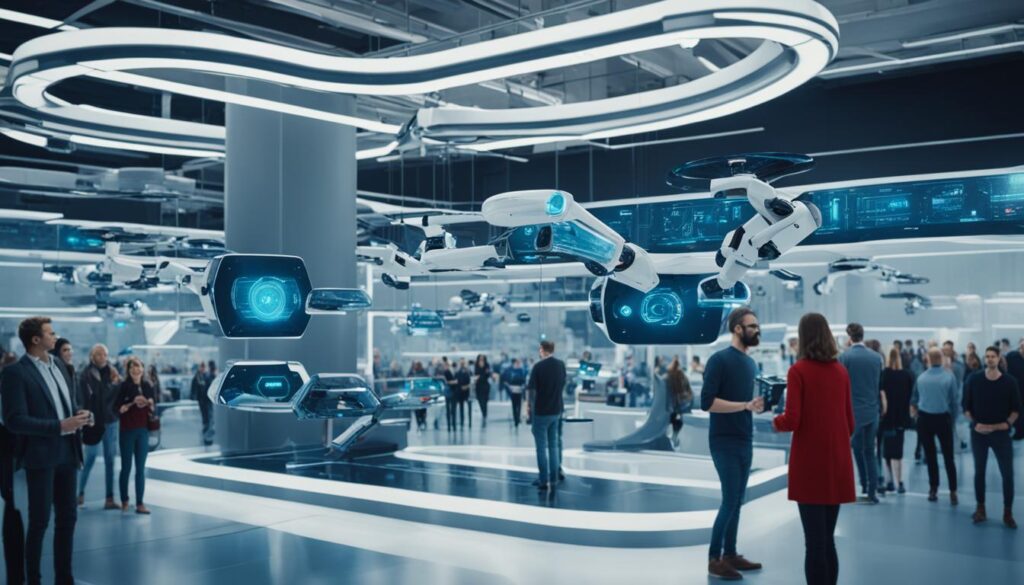AI: Transforming Our World with Smart Technology

Imagine waking up to a world where your coffee is brewed just right and your news is tailored to your interests. Traffic is gone, thanks to smart routes. This isn’t just a dream; it’s becoming real thanks to artificial intelligence (AI). AI technology is making our lives easier, from managing money to improving health care.
On Wall Street, AI has changed the game in high-frequency trading. Now, AI algorithms handle trades fast and cut down on mistakes1. This shows how AI is speeding up change in many fields.
But, many business leaders still don’t know much about AI. In 2017, only 17% of 1,500 top US business leaders knew about AI1. We need more education on AI’s benefits and effects.
Exploring AI shows it’s more than just a trend. It’s changing our economy, society, and daily life in big ways.
Key Takeaways
- AI is changing our lives, from how we invest to our daily routines.
- AI has made trading faster and more accurate1.
- China plans to invest $150 billion in AI to lead the world1.
- AI could add $15.7 trillion to the global economy by 2030, with big gains in North America and China1.
- Only 17% of US business leaders knew about AI in 2017, showing the need for more awareness1.
Introduction to Artificial Intelligence
Artificial Intelligence (AI) is a technology that acts like human intelligence to do tasks that need thinking, solving problems, and changing plans. It uses data analytics and neural networks to learn from lots of data like books and websites. This helps it understand patterns and language better, making it smarter over time2.
What is AI?
AI is about making systems that can do tasks that usually need human smarts. These systems can think and change plans, using data to make smart choices2. For example, AI chatbots in customer service get better at answering questions over time3. Users can also control how their data is used in AI, showing how important ethics in AI are2.
History and Evolution of AI
The history of AI has big steps from theory to real-world use in many areas. It started with thinking about how humans think and moved to complex neural networks and learning machines. Now, AI is changing healthcare by helping diagnose diseases and find new drugs, showing its big impact3.
Top courses in AI, taught by experts like Peter Norvig and Sebastian Thrun, help people learn and innovate. These courses range from basics to advanced projects, lasting from a few weeks to several months4.
Why AI Matters Today
AI is very important today because it’s changing many areas like finance and transportation. It helps find fraud and improve traffic flow, showing its value3. In marketing, AI helps target ads and understand how people feel, making a big difference.
AI also protects user privacy and lets people control their data, building trust and ensuring ethical use2.
Applications of AI in Finance
Artificial intelligence is changing the finance world fast. It’s using financial AI, automated decision-making, and robo-advisors. Banks and financial services use AI to get better data insights.
Automated Loan Decisions
AI is making lending faster and smarter. It uses machine learning to check credit risk. This has cut losses by 23 percent a year5.
Robo-Advisors in Investment
Robo-advisors are getting popular for their smart investment advice. They don’t let emotions guide their choices. These AI tools help banks test risks and see how markets might move5.
Companies like Kensho and AlphaSense are making AI tools for better financial analysis6. These tools are changing how we plan investments and manage money.
In summary, AI is changing finance with its automated decisions and robo-advisors. It’s making things more efficient, accurate, and better for customers. As AI grows, we’ll see more changes in banking and investing.
AI's Role in National Security
Artificial intelligence is changing how we defend ourselves around the world. It has made surveillance systems better, helping agencies work more effectively.
AI in Surveillance
AI is changing how we gather and analyze intelligence. AI-powered drones do surveillance, reconnaissance, and combat with little human help. They send back real-time data on security threats8. Facial recognition tech is also being used to match faces with watchlists quickly, helping police8. This tech helps fight cyberattacks fast, making us safer online8.
Project Maven: Military AI Application
Project Maven shows the U.S. military’s push into AI. It aims to use AI to handle big data, making military operations better. This project combines AI with defense plans to make data work easier and faster8.
AI in Healthcare Advancements

AI is also helping find new medicines for tough diseases like Parkinson’s and Alzheimer’s. Companies like Pfizer work with IBM Watson to speed up finding new treatments13.
Experts say the AI in healthcare market will hit $15.1 billion by 2022, showing how big and exciting this field is12.
AI is key in catching diseases early. Scopio Labs uses AI to quickly check blood samples for diseases like cancer and infections12. This means faster and more accurate diagnoses, which helps patients a lot. In real hospitals, VirtuSense uses AI to spot when patients might have a problem, cutting down on falls12.
But, AI also brings up challenges like ethical issues and data privacy. Still, the good things AI does in healthcare are huge, from better diagnoses to new research and monitoring health in real-time11.
| AI Application | Example | Impact |
|---|---|---|
| Medical Imaging | Google DCNN for Retinopathy | Efficient diagnostic grading13 |
| Drug Discovery | NuMedii AIDD Technology | New drug candidates for orphan diseases12 |
| Administrative Efficiency | NLP Tools | Improved communication and reduced costs11 |
| Early Disease Detection | Scopio Labs | Quick analysis of cell samples12 |
The Impact of AI on Smart Cities
Artificial Intelligence (AI) and the Internet of Things (IoT) are key to making smart cities. They help manage resources well, improve city infrastructure, and make transport better. This makes cities more sustainable and connected.
Intelligent Resource Management
Enhanced Transportation Systems
AI’s role in planning cities is clear. As cities add more smart tech, they’re getting closer to safer, more efficient places. With new tech, smart cities are leading the way to the future of living.
Challenges and Ethical Considerations of AI
AI is getting more advanced, and so are the ethical questions around it. It’s important to talk about AI ethics, privacy, and bias to make sure AI is used right.
Privacy Issues

Privacy is a big worry with AI because it needs lots of personal info. AI can give deep insights into things like sales trends, but it also risks our data security16. Many AI systems are hard to understand, known as the ‘black box’ problem, which makes us unsure and worried about our privacy17. Also, AI decisions without clear explanations can keep old biases, which means we need strong rules and clear AI use18.
Addressing Algorithmic Bias
AI can be biased, which means it might discriminate and make things unfair. In the U.S., many groups are working to fix this and make companies responsible18. Even though AI can make talking to humans better and help with making decisions, its biases can mess things up16. So, we need strict rules and global agreements to stop bad outcomes and make AI fair for everyone18.
Machine Learning and Deep Learning Concepts
Machine learning and deep learning are key parts of artificial intelligence. They help AI understand data trends and make predictions. This lets AI learn and improve on its own without needing to be programmed. Each has its own special features that set it apart.
Companies like Amazon use machine learning for things like recommending products based on what customers like. It works well with less data and can even run on a regular computer1920. Deep learning, however, needs a lot of data and special hardware like GPUs to work well. It’s great at doing complex tasks like recognizing images and speech, which it can do much faster than humans2019.
- Machine learning helps companies understand customers and suggest products they might like, needing some human help to get better.
- Deep learning does things automatically and can handle big, complex data sets, making it great for unorganized data.
- Big wins in deep learning, like Watson beating Jeopardy champions and AlphaGo defeating a human, keep pushing AI into new areas2021.
| Aspect | Machine Learning | Deep Learning |
|---|---|---|
| Data Size | Smaller data sets | Large data sets |
| Training Hardware | CPU | Specialized GPU |
| Human Intervention | More required | Less required |
| Correlation Type | Simple, linear | Non-linear, complex |
| Training Time | Shorter | Longer |
| Accuracy | Lower | Higher |
These differences make both machine learning and deep learning vital for improving AI and using data to its fullest.
The Future of AI: Human-Level and Transformative AI
The future of AI is full of promise, with developments that could change our world in big ways. We’re talking about transformative AI, which could change global dynamics, and human-level AI, which could think like us. These advancements will greatly improve our tech skills.
Transformative AI and Its Potential
Transformative AI is all about new innovations that could change many sectors, like the Industrial Revolution did. Already, AI has changed many areas: it helps with medical diagnoses, makes driving safer with self-driving cars, and helps with finance by spotting fraud22.
Human-Level AI: Myths and Realities
Human-level AI means making machines as smart as us. Some doubt it, but AI’s growth from symbolic AI to machine learning shows it’s possible22. This could make AI much better at solving problems in many areas.
The AI market is expected to jump from $150.2 billion in 2023 to $1,345.2 billion by 203024. As AI grows, we need to deal with its myths and realities to use it for good.
Enhancing Conversational AI with Language Models
Conversational AI is changing how businesses talk to their customers. It uses advanced language models and natural language processing (NLP). These technologies make text generation AI and AI sentiment analysis better. Let’s explore how these advancements make conversational AI more powerful.
Natural Language Processing (NLP)
NLP is key to making conversational AI understand human language well. Models like GPT-3 and GPT-4 give accurate answers, making customers happier and interactions better25. Over the last year and a half, generative AI has gotten better, opening up more ways for digital chats26. LLMs like GPT-3 and BERT are great at answering questions and analyzing feelings, helping businesses make users happier27.
Text Generation and Sentiment Analysis
Text generation AI lets conversational AI create text that sounds like it was written by a human. This means chatbots and virtual assistants can talk naturally, giving users a smooth experience27. LLMs also understand the context better, giving answers that are more relevant and coherent. This makes customers happier and helps businesses handle more users without spending more money25.
AI sentiment analysis helps conversational AI understand and react to feelings in user interactions. By using LLMs that know a lot about users, interactions become more personal and engaging27. This personal touch comes from analyzing customer data securely, leading to better responses and product suggestions that fit what users like25.
The Economic Impact of AI
Artificial intelligence is changing the economy in big ways. It’s set to play a huge role in the global GDP and how jobs change.
AI’s Contribution to Global GDP
Job Creation and Disruption
The AI job market is changing fast, with new jobs and some jobs disappearing. About 40 percent of all jobs could be affected by AI, with more in advanced economies29. In emerging markets, it’s 40 percent, and in low-income countries, 26 percent29. Workers will need new skills to keep up with these changes30.
Generative AI could add $2.6 trillion to $4.4 trillion a year across 63 use cases30. This shows how big AI could be for the economy and jobs.
Conclusion
As we wrap up our look at AI innovation, it’s clear AI is changing healthcare, finance, and transportation fast31. AI technology has big benefits but also big challenges, like its effect on society and ethical use32. Governments and groups are working hard to make sure AI helps us while fixing its problems32.
The future of AI is bright if we use it right and manage it well. We should look at AI’s success by how it helps people and fits with our values32. Working together, governments, schools, and AI experts can make sure AI is good for everyone3233. With a careful and fair way of using AI, we can use its power for the good of all.
FAQ
What is AI?
AI stands for artificial intelligence. It means systems that can do tasks that usually need human smarts. These systems can think, adapt, and make smart choices using data. AI includes many techs like natural language processing, machine learning, and neural networks.
What is the significance of AI in today’s world?
AI changes many areas, from finance to healthcare. It brings new ideas, makes things more efficient, and helps solve tough problems. Its power to handle lots of data makes it key for making smart decisions today.
How has AI evolved over the years?
AI has moved from just ideas to real-world uses in many areas. It went from simple rules to complex, smart responses. This change is thanks to advances in neural networks, deep learning, and machine learning.
How is AI utilized in the financial sector?
In finance, AI changes the game with automated loan decisions and robo-advisors for investments. These tools use data to offer custom investment plans and make decisions without emotions. This affects stock markets and helps catch fraud.
What role does AI play in national security?
AI is key in keeping countries safe, especially in watching over areas and in military projects like Project Maven. These efforts help manage big data, improve defense plans, and keep an eye on situations with AI tech.
How is AI transforming healthcare?
AI is changing healthcare by watching over patients in real-time, predicting health problems, and starting treatments early. Wearables with AI help make healthcare better and improve patient care with data analysis.
What impact does AI have on the development of smart cities?
AI and IoT make smart cities better by managing city resources and data well. This leads to smarter transport and city planning, seen in places like Barcelona.
What are the main challenges and ethical considerations of AI?
AI faces issues like privacy and bias in algorithms. Collecting lots of personal data can lead to misuse and unfairness. We need fair and open AI to protect rights and fairness.
What are machine learning and deep learning?
Machine learning and deep learning are parts of AI that look for patterns in data and predict what might happen. They learn and get better without being programmed, important for things like understanding images, texts, and complex data.
What does the future hold for AI?
The future of AI looks exciting with goals to reach human-level and transformative AI. Human-level AI aims to be as smart as us, while transformative AI could change the world as much as big historical events did.
How do language models enhance conversational AI?
Language models, using NLP, make conversational AI better by creating smart text and understanding feelings. These help improve customer service, personal assistants, and AI talks.
What is the economic impact of AI?
AI is set to greatly increase global GDP and change the economy. It will create new jobs but might also change old ones, showing AI’s creative and challenging sides in the job world.
Source Links
- How artificial intelligence is transforming the world | Brookings – https://www.brookings.edu/articles/how-artificial-intelligence-is-transforming-the-world/
- Research Guides: Introduction to Artificial Intelligence: For Faculty: Introduction to AI and ChatGPT – https://guides.iona.edu/ai
- Artificial Intelligence | An Introduction – GeeksforGeeks – https://www.geeksforgeeks.org/artificial-intelligence-an-introduction/
- Introduction to Artificial Intelligence | Udacity – https://www.udacity.com/course/intro-to-artificial-intelligence–cs271
- 33 Examples of AI in Finance 2024 | Built In – https://builtin.com/artificial-intelligence/ai-finance-banking-applications-companies
- Artificial Intelligence in Finance [15 Examples] – https://onlinedegrees.sandiego.edu/artificial-intelligence-finance/
- What is artificial intelligence (AI) in finance? – https://cloud.google.com/discover/finance-ai
- Artificial Intelligence (AI) Challenges and Opportunities in National Security – https://onlinewilder.vcu.edu/blog/ai-challenges-and-opportunities-national-security/
- Addressing the National Security Implications of AI – https://www.csis.org/analysis/addressing-national-security-implications-ai
- AI’s key role in cybersecurity and national security – https://thehill.com/opinion/congress-blog/4003351-ais-key-role-in-cybersecurity-and-national-security/
- Revolutionizing Healthcare: How is AI being Used in the Healthcare Industry? – https://www.lapu.edu/ai-health-care-industry/
- Contributed: Nine revolutionary ways AI is advancing healthcare – https://www.mobihealthnews.com/news/contributed-nine-revolutionary-ways-ai-advancing-healthcare
- Artificial Intelligence: How is It Changing Medical Sciences and Its Future? – https://www.ncbi.nlm.nih.gov/pmc/articles/PMC7640807/
- Cities of the future: Three predictions for AI’s impact on how we live and work | ASU Enterprise Technology – https://tech.asu.edu/features/AI-cities-of-the-future
- AI in Smart Cities – https://gemmo.ai/ai-in-smart-cities/
- Ethical concerns mount as AI takes bigger decision-making role – https://news.harvard.edu/gazette/story/2020/10/ethical-concerns-mount-as-ai-takes-bigger-decision-making-role/
- Common ethical challenges in AI – Human Rights and Biomedicine – www.coe.int – https://www.coe.int/en/web/bioethics/common-ethical-challenges-in-ai
- The Ethical Considerations of Artificial Intelligence | Capitol Technology University – https://www.captechu.edu/blog/ethical-considerations-of-artificial-intelligence
- AI vs. Machine Learning vs. Deep Learning vs. Neural Networks – https://www.ibm.com/think/topics/ai-vs-machine-learning-vs-deep-learning-vs-neural-networks
- Deep Learning vs. Machine Learning: A Beginner’s Guide – https://www.coursera.org/articles/ai-vs-deep-learning-vs-machine-learning-beginners-guide
- What’s the Difference Between Artificial Intelligence, Machine Learning and Deep Learning? – https://blogs.nvidia.com/blog/whats-difference-artificial-intelligence-machine-learning-deep-learning-ai/
- AI: the future of humanity – Discover Artificial Intelligence – https://link.springer.com/article/10.1007/s44163-024-00118-3
- The Future of AI is Now – https://today.ucsd.edu/story/the-future-of-ai-is-now
- The Evolution and Future of Artificial Intelligence | CMU – https://www.calmu.edu/news/future-of-artificial-intelligence
- 5 Advantages of LLMs and Conversational AI Chatbot Solutions for Business – https://servisbot.com/conversational-ai-chatbot-solutions/
- RAG-Enhanced Conversational AI: A Comprehensive Guide – https://www.forumone.com/insights/blog/rag-enhanced-conversational-ai-a-comprehensive-guide/
- LLMs for Chatbots and Conversational AI: Building Engaging User Experiences – https://www.signitysolutions.com/blog/llms-for-chatbots-and-conversational-ai
- Impact of Artificial Intelligence (AI) on the Economy & Jobs – https://business.bofa.com/en-us/content/economic-impact-of-ai.html
- AI Will Transform the Global Economy. Let’s Make Sure It Benefits Humanity. – https://www.imf.org/en/Blogs/Articles/2024/01/14/ai-will-transform-the-global-economy-lets-make-sure-it-benefits-humanity
- The economic potential of generative AI: The next productivity frontier – https://www.mckinsey.com/capabilities/mckinsey-digital/our-insights/the-economic-potential-of-generative-ai-the-next-productivity-frontier
- CONCLUSION TO ARTIFICIAL INTELLIGENCE | La Plage Academy – https://laplageacademy.com/courses/artificial-intelligence/lessons/conclusion-to-artificial-intelligence/
- Conclusions – https://ai100.stanford.edu/gathering-strength-gathering-storms-one-hundred-year-study-artificial-intelligence-ai100-2021-3
- Conclusion: Questions for Artificial Intelligence | Birth of Intelligence: From RNA to Artificial Intelligence – https://academic.oup.com/book/39658/chapter/339638244



